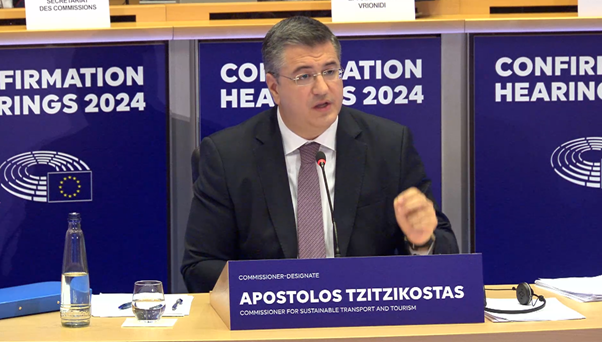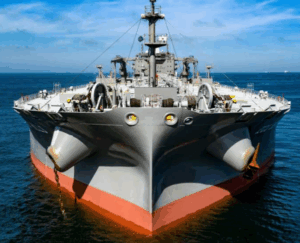
Apostolos Tzitzikostas, a Greek politician who is the European Commissioner-designate for Sustainable Transport and Tourism, speaking on Monday from Brussels, stressed that he will focus on enhancing the competitiveness of the EU’s transport sector.
The Greek politician plans to come forward with a sustainable transport investment plan in 2025 and to present a strategy for European ports.
“I take carbon leakage very, very seriously because, as you all know, 70% of EU global trade happens through our ports, so we need to protect our ports.”
He said that there is a need to support the production and the affordability of sustainable fuels and electrification, where possible.
On Monday evening, the Transport and Tourism Committee questioned Apostolos Tzitzikostas, for the sustainable transport and tourism portfolio.
To push for transport decarbonisation solutions, such as the production of sustainable fuels and the development of charging infrastructure, he committed to presenting a sustainable transport investment plan in 2025.
“To support the decarbonisation of the sector, I will come forward with a sustainable transport investment plan in 2025, and because climate change does not stop at our borders, I will work with ICAO and IMO to pursue an equally ambitious global agenda in coordination with the Member States,” he said.
He urged the need to work a lot, as he said, into incentivising investments and having investment clarity in order to have investors investing in the creation of alternative fuels, SAF and other technologies, of course, for maritime.
In his speech, Apostolos Tzitzikostas, noted that when it comes to issues of maintaining security in ports, it is the Member States that are responsible for that. “The European Union cannot deal with protecting our ports from Mafia gangs.”
“However, I will be here to monitor the situation and make sure that we include, in our port strategy, issues concerning the safety and security of our ports, because indeed, as I said earlier, European ports are trading 75% of the whole EU trade. So, it’s very important not only to have good connectivity, but at the same time to have secure and safe places for our workers and the people that are involved in this chain.”


